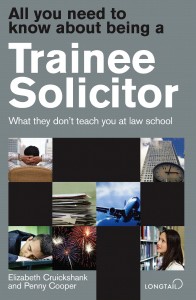Working in a law firm isn’t just about knowing the Law. That might have been true decades ago before the advent of newspaper advice columns and consumer advice programmes, but now every senior practising solicitor spends a considerable amount of time in “client development” and keeping up with what is going on in the businesses and lives of existing clients. Law firms now place considerable emphasis on the acquisition of “soft skills”, for example knowing how to make existing clients feel valued and learning how to acquire new clients.
Certainly these are skills that trainees will need to develop and good law firms will guide them, but trainees who recognise that their main purpose is to assist their firms to earn money by being helpful, by being willing to learn and by having a degree of humility, save themselves a great deal of anxiety and heartache.

Being helpful
First of all accept that your supervisors are busy people and may ask you to do relatively menial things to save them time, such as getting a cup of coffee, arranging a meeting room, rushing down to the Post Room with an urgent request or even typing up a letter. This may seem like a waste of your expensive legal education, but will earn you goodwill from a frazzled more senior lawyer, especially if you do the best that you can, because the name of the game is now to provide the most efficient and accurate service that you can for the firm’s clients. It’s not about passing exams in academic subjects. In legal practice a 50% pass mark or even a 70% one will not do. Anything less than 100% accuracy and efficiency can have severe consequences for a firm’s clients and indemnity insurance premiums.
Basic requirements
New trainees find that most of their work consists of research, form-filling, getting “ the ducks in a row” (a.k.a organised), attending meetings and drafting documents through from simple letters to Instructions to Counsel. The precise mix will depend on the individual seat, the size of the firm and the complexity of the matters that your supervisor is working on at any one time. All will require that you can communicate effectively, both orally and on paper.
Organisation
Being well organised is crucial. It is an essential requirement of some legal work and in any event will make your supervisor’s life more efficient. Organising yourself and your personal work space and materials will make it far easier to survive the hurly-burly of office life.
Supervisor organisation covers such things as ensuring that letters and research notes are filed properly, that letters you write for your supervisor to send out are immaculate, that plans are properly coloured and that plan references match precisely any reference to them in letters and documentation. It also covers ensuring that any bundles or files of papers necessary for a meeting or an appearance in Court are in order.

You will be surprised at just how much of a lawyer’s life is taken up with organising matters for other people. Each department will have its own particular organisation requirements. Large corporate transactions, particularly of the M &A sort require multiple copies of many documents to be signed in a particular order. Someone needs to ensure that these are in order and correctly marked up with indications of where each individual is to sign. Time really is money if the directors of two companies have gathered and three essential documents are missing. Someone then has to ensure that all follow up documents are filed in the correct place, whether Companies House or the Land Registry. That “someone” is usually a trainee or a junior lawyer.
Even small property transactions require meticulous organisation, to make sure that money is in the correct place, that completion monies are correctly allocated, that title is amended with the Land Registry and that the client has copies of all the documents he has asked for. It’s the simplest things that trip you up – sending out an engrossment of the second draft of a Will rather than the final agreed draft, not checking the plans to be submitted to the Land Registry, omitting several exhibits in one of the bundles that you take to Court, sending a letter meant for your client to the solicitor on the other side….. Some of these things are not merely irritating or embarrassing for your supervisor, but they can be the stuff of future litigation.
Develop checklists and pro forma letters to ensure that you have a sound base from which to start on a new matter. “The Legal Practice Companion” by Gerald Montagu and Mark Weston will give you some sound examples.
Being organised also involves keeping good records of the work you have done ready for your end of seat assessments and having copies of the research you have done, letters of advice you have written and lists of contacts filed and to hand. At the end of each day make a list of what you expect to work on the following morning and ensure that deadlines are clearly marked in your diary. Organised trainees should be prepared for most foreseeable eventualities – money for a taxi, a fully charged mobile, a decent briefcase for papers — but what about being sent out of the country on a moment’s notice to obtain the signature of an important client? Would you have an on flight bag, clean shirt, toiletries to go, up to date passport?
Meetings
Meetings can give a respite from paperwork in the office and give an insight into how good (and bad) lawyers operate. They can be informative (they can put the law that you’ve learned in context and get you up to speed on new developments) exciting (when negotiations get tense and tempers are frayed) or sometimes very boring. If you don’t understand what is happening don’t be tempted to sign off and indulge in random people-watching.
Go armed with a notebook and pen and always take notes even if you have not been specifically allocated this task. Taking notes helps to focus the mind and acts as a prompt to check abstruse points with your supervisor later. Read them through afterwards to test whether you really understood what was going on, even if no one asks you about them. Don’t assume that your supervisor knows everything. He may nod sagely if another solicitor or barrister mentions a case, but not be totally au fait with its implications. He may not indeed have remembered the name of the case accurately. You should have noted it down so that someone (usually you) can look it up afterwards and present a summary and an analysis of its implications.
If you are specifically asked to take notes of the meeting and then to write them up, do so precisely in the format requested, with the usual heading of date and purpose of meeting and list of attendees and their organisations. It may seem creative to write the notes up in dialogue form, especially if there are only 2 attendees (other than you, the note-taker) but most lawyers prefer the more cumbersome formality of the “Mr X said” and “Miss Y responded” format.
Write up the notes chronologically, breaking up your narrative into clearly numbered sections incorporating the correct legislative or case references. “The Blackwood case” or “section 79(a)” are in themselves meaningless without context. If decisions were taken at the meeting, conclude with a paragraph headed “Action” indicating who is responsible for each task.
Don’t ever bin your notes until you have a comprehensive permanent record, preferably agreed with your supervisor. You may well need an aide-memoire when you have moved to another seat and are quizzed on a case mentioned in a meeting nine months previously.
Research
Familiarisation with the firm’s Library facilities, online resources and information banks is essential as is getting on side with the Library staff and in the larger firms, the Information or Know-How Officers. Knowing where to go and whom to ask for help saves a great deal of precious time.
Research undertaken by trainees will usually have an immediate practical purpose, perhaps to assist a more senior fee-earner in writing an article or a Client Practice Note on a new legal development, but more often it will be directed towards giving advice on a specific matter. Understanding the purpose of the research and gleaning as much background information as possible before you start will keep your research focused.
Take down your instructions carefully, ensuring that you understand the context so that you do not waste time on irrelevant reading. Think it through and if you are puzzled go back and ask for further and better particulars.
The first paragraph of a research note should set out the purpose of and background to the research. This focuses the minds of both the researcher and the reader and indicates very swiftly whether the reader is likely to find the answer in the remainder of the note to the questions originally posed.
Research notes should not contain unsubstantiated assertions. Detailed references to the relevant legislation, case law and books consulted should all be included. You may have missed an important detail or your supervisor may be so surprised by the results of your research that he feels that he really must check some of the sources himself. Don’t treat this as a slight; you’re not having a test paper marked, you are engaged in a collaborative effort.
Finally come to some conclusions if you can. One of the commonest criticisms of trainees is that they do not apply the law with sufficient imagination to the matter in hand, perhaps being too keen to save a small amount of income tax now without thinking ahead to the possible consequences for your client’s capital gains tax position on a future sale.
Set out your research clearly, with appropriate headings and numbered paragraphs so that it is easy to read. Resist any temptation to use flowery language when clear legal presentation is required.
And finally, don’t expect to have a response to your research immediately, especially if it was not required for an urgent client matter. You may hear nothing but a mumbled “thank you” for several weeks, when, freed from pressing client concerns, your supervisor will be eager to talk to you about some minute point that is buried in the recesses of your memory. Keep a copy of your research note to hand so that you can make an intelligent response.
Elizabeth Cruickshank and Professor Penny Cooper of The City Law School are the authors of ‘All you need to know about being a Trainee Solicitor’ (Longtail, 2008) and together with Boma Ozobia of “The Survival Manual for New Wigs” (Odade 2010).

